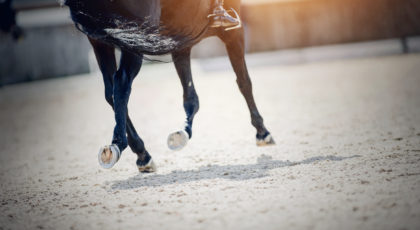Although horses can survive a remarkable range of environmental conditions, surviving is not the same as thriving. Winter is hard on any horse but particularly so for seniors.
Like older people, older horses are not as good at regulating their body temperature and will feel the effects of the cold more than healthy younger horses. Shivering is the most obvious visible sign that the horse is cold, but more subtle effects can also be taking a toll.
Older horses may have to spend more of their calories on trying to keep warm, leading to more weight loss than in younger horses. Even slight drops in muscle temperature have a negative effect on muscle metabolism and strength. Lowered body temperatures (hypothermia) and vacillating body temperatures have also been linked to higher risk of infections, even under hospital conditions.
Cold weather has negative effects on horses with chronic joint, bone or tendon/ligament problems. Animals that are reasonably comfortable and mobile in warmer weather often become very stiff in the cold. Serious problems can arise in regard to their ability to compete with herd members for food and water, and how easily they can get up and down. It’s common for seniors that do ok in warmer weather to need considerable assistance to get up when it’s cold. Thus, impending winter weather is often a factor in the decision to euthanize an older horse.
The march of time is beyond our control, but some proactive measures can help seniors to function the best possible in winter weather. Blanketing debates have no place in the care of senior horses. Yes, your younger adults can and usually do function just fine without blankets but we’re talking about the elderly here, where impaired ability to keep warm is a given. Blanketing will help the older horse conserve calories and improve mobility and muscular function.

©Flickr/EricLamontagne
Increasing thyroid hormone output is a basic mechanism for dealing with cold exposure in normal horses. Older horses, especially those with other hormonal issues like Cushing’s disease, may have depressed thyroid function that interferes with this. Speak to your veterinarian about testing thyroid hormone levels and possible benefits of supplementing if necessary.
Wrapping the lower legs helps prevent excessive stiffness from joint or tendon/ligament issues (fleece lined shipping wraps work great for this and are easy to use). For the knees and hocks, neoprene wraps used part of the day (e.g. overnight) provide significant warming effects.
As for diet, it’s true at all ages that a high fiber diet is warming because of the heat created during fermentation of fiber in the hind gut. However, the caloric density of a high hay diet may not be enough to maintain weight in an older horses. Beet pulp and bran mashes boost calories without overloading simple carbohydrates. They also help guarantee adequate water intake to combat impaction—as does adding at least 1 oz/day of salt to meals. The cold pressed oil blend CocoSoya is useful because of its high palatability and caloric density.
These adaptations for seniors are relatively minor in terms of what they cost in time and money but can make a big difference to the horse’s comfort.
All content is for informational purposes only. Contact your local veterinarian if you have any questions regarding the health of your animals.
About the Author
Eleanor Kellon is the Staff Veterinary Specialist for Uckele Health and Nutrition. Dr. Kellon also offers private nutritional consultations and online courses through Equine Nutritional Solutions. Find out more at www.drkellon.com.

 January 20, 2017
January 20, 2017 

























